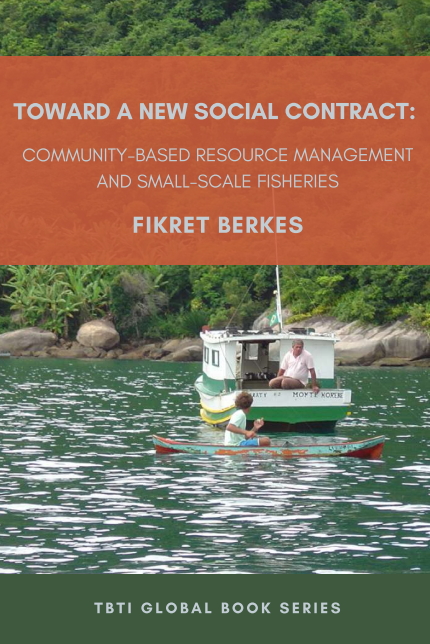Yazar: Fikret Berkes
TBTI Global
312 Sayfa
ISBN: 978-1-7773202-4-9
2021
(görsel ve bilgi: tbtiglobal.net)

Yazar: Fikret Berkes
TBTI Global
312 Sayfa
ISBN: 978-1-7773202-4-9
2021
(görsel ve bilgi: tbtiglobal.net)
It was partly for a selfish reason that I approached Prof. Berkes on whether he would be interested in writing a book for TBTI. Like many, I was fascinated, not only by the number of books and papers that he has written, but also the wide range of topics and geographic scope of his work. We are familiar with the concept ‘community-based resource management’ and the acronym CBRM, but how did it start? The first chapter of this book does not disappoint on that front, as we get the full account of Prof. Berkes’ journey, and what makes him known for CBRM. I was also pleasantly surprised by his connection with Bonne Bay, Newfoundland, and was rather pleased when he accepted to use a photo that I took during one of my many visits to the area in Chapter 1. It seems that Bonne Bay has never lost its charm, as it is also part of what keeps me in Newfoundland.
Prof. Berkes referred to Cree fishers as ‘masters in their environment’. This book shows that he is also that in the academic domain. One might say that Prof. Berkes’ work is mainly about natural resources, broadly speaking. But throughout this book, we can see that small-scale fisheries are well integrated in his work, and he clearly presents the many nuances about small-scale fisheries, and argues strongly for the special attention to improve the governance of this sector. He was among the first to raise issues about the need for alternative approaches to small-scale fisheries management. He brings solid evidences of that, with his research and field visits to small-scale, coastal communities around the world. His work lends itself to endorsing, with undisputable authority, that small-scale fisheries are better equipped to deal with change, including climate and environmental change than their large-scale counterpart. Faced with overfishing and fisheries unsustainability, and amidst Covid-19 pandemic, it is time to turn to small-scale fisheries and coastal communities for solutions, rather than seeing them as problems. This book by Prof. Berkes, “Toward a New Social Contract,” tells us why, and how. People familiar with transdisciplinary (TD) concept and perspective might be wondering why Prof. Berkes is not using the term in his book, even though it is obvious that he is a true pioneer in TD. Reading the book, especially Chapter 5, we certainly see the same rationale for, and process of, transformation, through facilitation and co-production of knowledge, which are the essences of TD. His work with indigenous and non-indigenous communities bodes well of his true appreciation for local, traditional and indigenous knowledge, and the importance of incorporating them in management and governance. With the publication of the book ‘Linking Social and Ecological System’ (SES) in 1998 (with Carl Folke), who would question the need to look at fisheries, coastal and natural resources from the TD lens? Needless to say, SES became another well-known acronym, among resilience and TD scholars interested in a framework that integrates and broadens perspectives in resource governance. The practice of TD shows up again when Prof. Berkes talks about transformation and transformative learning in Chapter 11.
Now that the (academic) life of Fikret is an ‘open book’ for us, we invite you to delve in and enjoy learning about the many twists and turns that have shaped his work, making him one of the leaders in the publication scoreboard, and appreciate why he is so respected and admired by his students and peers
around the world. Let’s also keep in mind, as we read this book, that it is quite alright, in fact encouraged, to challenge ourselves, and our own paradigm, as Prof. Berkes has done throughout his career.
Ratana Chuenpagdee – TBTI Global Director
Bağlantı:
Yorumlar
İlk Yorumu Ekle